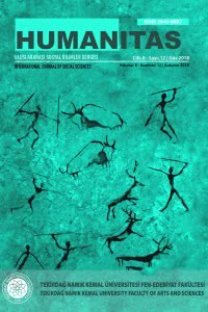EYLEM ODAKLI YAKLAŞIMIN BOYUTLARI ÇERÇEVESİNDE İKİ FRANSIZCA YABANCI DİL DERS KİTABININ KARŞILAŞTIRMALI İNCELEMESİ
Eylem odaklı yaklaşımın ortaya çıkışını takiben birçok ders kitabı Fransızca yabancı dil öğretimi alanında yerini almıştır. Çalışmamızda, alandaki ders kitaplarının eylem odaklı yaklaşımın ana ilkelerine ne denli uyumlu olduğunu belirlemek amacıyla incelenmek üzere iki ders kitabı örneklem olarak seçilmiştir: Nouveau Rond-Point Pas à Pas 1 (A1) ve Version Originale (A1). Araştırmamız, söz konusu ders kitaplarında, eylem odaklı yaklaşımın ana hatlarına uygunluğunu tespit etmeyi hedeflemektedir. Bu amaçla üç analiz anketi kullanılmıştır; eylem odaklı yaklaşımda bildirişimsel görevler anketi, proje tabanlı öğrenme anketi ve kültürlerarasılık anketi. Elde edilen sonuçlara göre, Nouveau Rond-Point ders kitabının, eylem odaklı yaklaşıma daha uygun hazırlanmış olduğu görülmüştür. Bununla birlikte; Version Originale kitabının da genelinde söz konusu yaklaşıma uygunluğu tespit edilmiş olup, bazı bölümlerinin ve projelerinin yeniden ele alınması önerilmektedir.
Anahtar Kelimeler:
Eylem Odaklı Yaklaşım, Yabancı Dil Olarak Fransızca Öğretimi, Görevler, Projeler, Kültürlerarasılık
A COMPARATIVE ANALYSIS OF TWO FRENCH FOREIGN LANGUAGE TEXTBOOKS ACCORDING TO THE PRINCIPLES OF THE ACTION-ORIENTED APPROACH
Several textbooks designed according to the action-oriented approach have been presented in the teaching of French as a foreign language. In order to analyze the compliance of the textbooks with this approach, two textbooks were analyzed: Nouveau Rond-Point Pas à Pas 1 (A1) and Version Originale (A1). Three questionnaires were applied to the textbooks: one for tasks, another for projects and another one for interculturality. Based on the results obtained, the textbook Nouveau Rond-Point is more in line with the principles of the action-oriented approach. It should be pointed out that even if the textbook Version Originale departs from these principles quite significantly and some points need to be improved; it is, in the same vein, close to the action-oriented approach in its generality.
___
- Andrianirina, H. (2011). Analyses des usages d'un dispositif hybride d’apprentissage du français et éléments pour un appui à la conception de dispositifs en contexte malgache. (Doctoral dissertation). Université Blaise Pascal-Clermont-Ferrand II, Clermont-Ferrand.
- Aslım Yetiş, V. & Elibol, H. (2014). L’interculturalité à travers les méthodes de français « Latitudes ½ » et « Alter Ego ½ ». Synergies Turquie, 7, 179-200.
- Aslım Yetiş, V. & Dündar, A.E. (2016). La compétence interculturelle dans Salut 10, 11 et 12. Çukurova Üniversitesi Eğitim Fakültesi Dergisi, 45(2), 181-208.
- Beacco J.C. (2008). Tâche ou compétences ? Le français dans le monde, n° 357(Mai, 2008), 33-35.
- Chaves, R.-M., Favier, L. & Pélissier, S. (2012). L’interculturel en classe. Grenoble : PUG.
- Conseil de l’Europe. (2001). Cadre européen commun de référence pour les langues. Apprendre, enseigner, évaluer. Paris : Didier.
- Hougardy, A., Hubert, S. & Petit C. (2001). Pédagogie du projet?. @pprentissage et utilisation d’Internet, 1-6.
- Klett, E. (2012). Le manuel pour enseigner une langue étrangère : Entre faiblesses et vertus. Synergies Venezuela, 7, 7-16.
- Ministère de l’éducation nationale. (2012). Les manuels scolaires : situation et perspectives. Rapport (2012-036). http://cache.media.education.gouv.fr/file/2012/07/3/Rapport-IGEN-2012-036- Les-manuels-scolaires-situation-et-perspectives_225073.pdf
- Neves, L. (2015). Le rôle du manuel de FLE dans une approche (pluri) actionnelle. Revista Non Plus, 5, 37-49.
- Thibert, R. (2010). Pour des langues plus vivantes à l’école. Dossier d’Actualité, 58, 1- 12.
- Soubrié, T. (2008). Un nouveau cadre pour la conception d’activités TICE : la perspective actionnelle du CECR. Bizarro, Ensinar e aprender linguas e culturas estrangeiras hoje: que perspectivas ? Porto: Areal Editores, hal-01162278, (1), 68-81.
- Vergues, M. & Giroux, C. (2011). L’oral dans la langue-culture. Québec français, (163), 66-67.
- Yıldırım, A. ve Şimşek, H. (1999). Sosyalbilimlerde nitel araştırma teknikleri. Ankara: Seçkin Yayınları.
- Windmüller, F. (2011). Français langue étrangère (FLE): l'approche culturelle et interculturelle. Paris: Belin.
- ISSN: 2147-088X
- Yayın Aralığı: Yılda 2 Sayı
- Başlangıç: 2013
- Yayıncı: Namık Kemal Üniversitesi
Sayıdaki Diğer Makaleler
BİR EŞYA OLARAK ARABA: LATİFE TEKİN’İN BUZDAN KILIÇLAR VE JOSÉ SARAMAGO’NUN “EMBARGO” ESERLERİ
Aslı Eda DÜNDAR, Veda ASLIM YETİŞ
MAURICE: LACANCI BAKIŞ AÇISIYLA “AYNA, AYNA, GÜZEL AYNA …”
AYSEL ÖZAKIN’IN MAVİ MASKE ADLI ESERİNDE “ÖTEKİ”NİN İŞLEVSELLİĞİ
RUMELİ DEMİRYOLLARI EGE DENİZİ BAĞLANTI HATTINDA YENİ BİR LİMAN KENTİ: DEDEAĞAÇ (1872-1912)
Onur Kemal BAZARKAYA, Nurseda KALEMCİ
ERDEMLE İLGİSİNDE MİLL’İN FAYDACI AHLAK ANLAYIŞININ ELEŞTİRİSİ
POSTMODERNİST ANLATININ BİLİM-KURGU İLE ANAKRONİK BULUŞMASI: KONSTANTİNİYYE ÜÇLEMESİ
KENTLEŞME SÜRECİNDE İNSAN İLİŞKİLERİNİN NİTELİKSEL DEĞİŞİMİ (SİVAS KENT ÖRNEĞİ)
PATRICK MCCABE’İN THE BUTCHER BOY ADLI ROMANINDA KÖTÜCÜL NOSTALJİ
